#John Hopkins university
Text
Happy Pride month to the……Non-men, Gays and Bi-sexuals. 🤦🏻♀️ But of course gay men are still men. 🤦🏻♀️
Outrage has been expressed online at Johns Hopkins University over its non-binary-inclusive definition of "lesbian" in its glossary of LGBTQ+ terms.
The Baltimore-based university, a major hub of medical research in the U.S., maintains an extensive glossary of definitions for terms relevant to the broad LGBTQ+ community, which is updated as the subject of gender and sexual identity changes.
On Monday, the glossary's new definition of "lesbian" came under attack as the university defined the term as "a non-man attracted to non-men." The update is meant to be inclusive of non-binary individuals who might still identify as lesbians.
Social media users accused Johns Hopkins of attempting to "erase" women. They also pointed to the glossary's listing for "gay man," which does not use similarly non-binary-inclusive language.
The flare-up comes amid a broader backlash to LGBTQ+ rights and the embrace of queer communities by society. Numerous state legislatures across the U.S. have begun passing laws that target transgender communities, taking particular aim at the ability to get gender-affirming care for trans children. There has also been a vocal, if not definitively widespread, lashing out against companies and brands that market to LGBTQ+ communities or hold Pride Month events.
Newsweek has reached out to Johns Hopkins via email for comment.
The definition prompted a backlash on social media. LGBTQ+ influencer and lesbian vlogger Arielle Scarcella tweeted: "Why is a lesbian a non-man but a gay person isn't a non-woman? Progressive misogyny."

Twitter user Amy Curtis added: "What is this absolute nonsense... We are women."

Oli London, who is a critic of "gender ideology," also waded in, as did British TV talk show presenter Julia Hartley-Brewer, who tweeted: "What the actual f....? So now we're not just reduced to being body parts or bleeders or a mere subset of women, we're now 'non-men'."

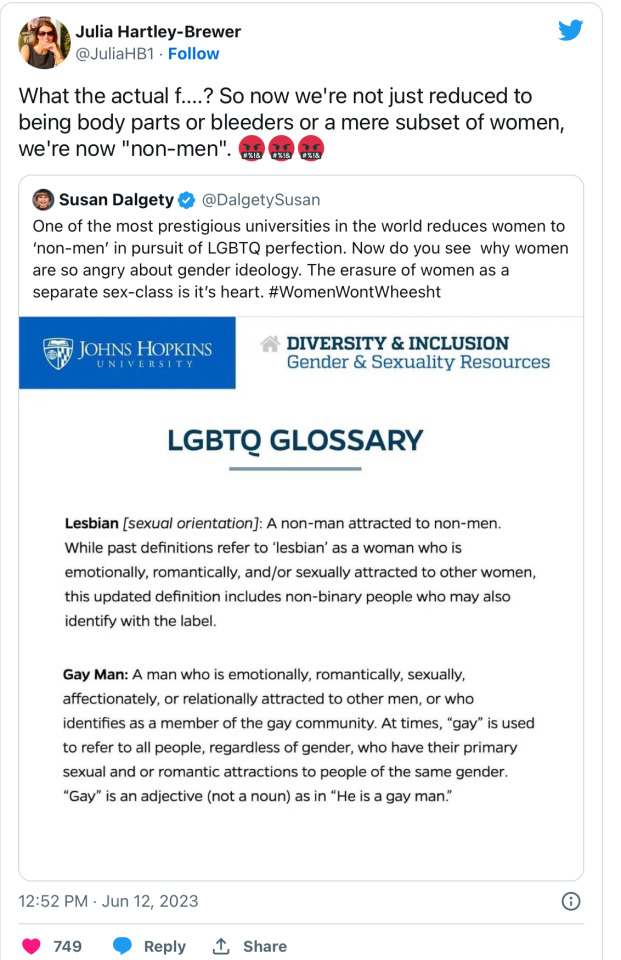
Gay rights activist Fred Sargeant added: "Inarguably, modern times are now the stupidest time and universities are leading the way.."

The definition provided by Johns Hopkins is notably distinct from those in similar LGBTQ+ glossaries maintained by the Anti-Defamation League (ADL) and the Human Rights Campaign (HRC).
The HRC's first sentence in its definition of lesbian reads: "A woman who is emotionally, romantically or sexually attracted to other women." There is a second sentence adding that non-binary people may use the term to describe themselves.
The ADL's glossary defines lesbian as a "woman who is emotionally, physically and/or romantically attracted to some other women."
#John Hopkins University#Drop the TQ+#Lesbians are Adult Human Females who like other Adult Human Females#Gay men are still called men#Progressive misogyny#Just say Woman
59 notes
·
View notes
Text
Johns Hopkins University: Overview, Acceptance Rate, World Ranking, and Study Options
Johns Hopkins University (JHU), located in Baltimore, Maryland, is one of the most prestigious research universities in the United States. Founded in 1876, Johns Hopkins University is renowned for its research initiatives, particularly in the fields of medicine, public health, engineering, and international studies. The university is committed to advancing knowledge and fostering innovation, making it a leading institution both nationally and internationally.
Acceptance Rate
Johns Hopkins University Acceptance Rate is known for its competitive admissions process. For the Class of 2027, the acceptance rate was approximately 8.7%. This reflects the university’s selectivity, with a rigorous application process that evaluates academic performance, standardized test scores (though test-optional policies apply), extracurricular activities, essays, and letters of recommendation. The low acceptance rate indicates the high level of competition among applicants seeking to join this elite institution.
World Ranking
Johns Hopkins University World Ranking consistently ranks among the top universities globally. According to the QS World University Rankings 2024, JHU is positioned at 10th place worldwide. This high ranking highlights the university’s strong global reputation for academic excellence, research impact, and overall quality of education. JHU’s emphasis on research, particularly in fields like medicine and public health, contributes significantly to its high standing in global rankings.
Study MBBS Abroad
Johns Hopkins University does not offer a Bachelor of Medicine, Bachelor of Surgery (MBBS) program. In the United States, medical education typically follows a different pathway. Prospective medical students usually complete an undergraduate degree before entering medical school, which awards a Doctor of Medicine (MD) degree rather than a Study MBBS Abroad. Johns Hopkins School of Medicine offers a highly esteemed MD program and is one of the top medical schools in the world, known for its groundbreaking research and clinical training.
For students interested in studying medicine abroad and looking for MBBS programs, universities in countries like the UK, Australia, and Canada offer MBBS or equivalent programs. Notable examples include the University of Oxford, the University of Melbourne, and the University of Toronto.
QS Ranking
In the QS World University Rankings 2024, Johns Hopkins University QS Ranking holds the 10th position globally. This ranking reflects the university’s excellence in several key areas:
Academic Reputation: JHU is widely recognized for its rigorous academic programs and research contributions across various disciplines. Its reputation for quality education significantly influences its high ranking.
Research Output: The university is renowned for its research initiatives, particularly in medicine, science, and engineering. The volume and impact of research published by JHU faculty contribute to its strong position in global rankings.
Faculty/Student Ratio: JHU maintains a low faculty-to-student ratio, ensuring personalized attention and high-quality interactions between students and faculty members.
Employer Reputation: Graduates from Johns Hopkins University are highly sought after by employers, reflecting the institution’s strong emphasis on preparing students for successful careers.
Programs and Courses
Johns Hopkins University offers a diverse range of programs across various fields. Here are some key programs and their descriptions:
Bachelor of Arts in International Studies
Description: This program provides students with a comprehensive understanding of global issues, international relations, and cultural dynamics. Students engage with topics such as diplomacy, global economics, and international conflict.
Duration: 4 years
Key Subjects: International relations, global economics, political science, cultural studies, conflict resolution.
Bachelor of Science in Biomedical Engineering
Description: This program combines engineering principles with biological sciences to address medical and healthcare challenges. Students gain skills in designing medical devices, understanding human physiology, and conducting biomedical research.
Duration: 4 years
Key Subjects: Biomaterials, medical imaging, biomechanics, bioinformatics, physiological systems.
Master of Public Health (MPH)
Description: The MPH program prepares students for leadership roles in public health. It focuses on understanding and addressing health issues at the community and global levels, with specializations in areas such as epidemiology, health policy, and environmental health.
Duration: 1.5 to 2 years
Key Subjects: Epidemiology, biostatistics, health policy, environmental health, social and behavioral sciences.
Master of Science in Data Science
Description: This program provides advanced training in data analysis, statistical methods, and computational techniques. It prepares students for roles in data-driven decision-making and research across various industries.
Duration: 1.5 to 2 years
Key Subjects: Data analysis, machine learning, statistical modeling, data visualization, programming.
Doctor of Medicine (MD)
Description: The MD program at Johns Hopkins School of Medicine is designed to provide comprehensive medical education, combining clinical training with research opportunities. The program emphasizes critical thinking, medical research, and patient care.
Duration: 4 years
Key Subjects: Clinical medicine, medical research, anatomy, internal medicine, surgery.
PhD in Biomedical Sciences
Description: This doctoral program focuses on advanced research in biomedical sciences. Students work on innovative research projects and contribute to advancements in areas such as genetics, molecular biology, and pharmacology.
Duration: 4 to 5 years
Key Subjects: Molecular biology, genetics, pharmacology, research methodology, biomedical research.
Conclusion
Johns Hopkins University (JHU) stands out for its prestigious reputation, competitive admissions process, and high global rankings. While it does not offer an MBBS program, its Doctor of Medicine (MD) program is highly regarded for its excellence in medical education. JHU’s diverse range of programs and strong emphasis on research contribute to its top-tier status in global university rankings. For students seeking a world-class education and research opportunities, JHU represents a premier choice across various academic disciplines.
0 notes
Photo

In a new paper, a team of philosophers and psychologists at Johns Hopkins University claims to have finally settled an ancient debate: whether you can actually hear the sound of silence.
In a mind-bending conclusion, they found that you absolutely can.
(via Scientists Discover That You Can Hear Silence)
0 notes
Text
The quest to show that biological sex matters in the immune system | MIT Technology Review
A handful of immunologists are pushing the field to take attributes such as sex chromosomes, sex hormones, and reproductive tissues into account.
(more…) “”
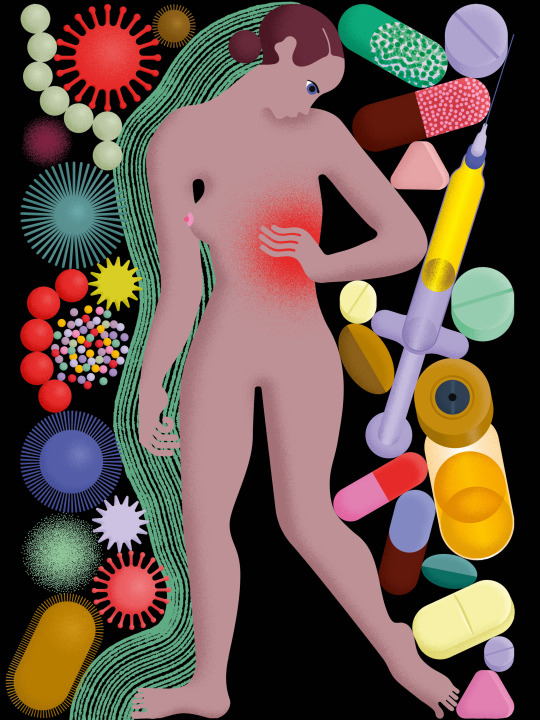
View On WordPress
#ambien#cancer#covid-19#FDA#gender#health#HIV/AIDS#hormones#immune system#john hopkins university#sabra klein#vaccines#yellow fever#zolpidem
1 note
·
View note
Text
By: Jesse Singal
Published: Jun 27, 2024
In April Hilary Cass, a British paediatrician, published her review of gender-identity services for children and young people, commissioned by NHS England. It cast doubt on the evidence base for youth gender medicine. This prompted the World Professional Association for Transgender Health (WPATH), the leading professional organisation for the doctors and practitioners who provide services to trans people, to release a blistering rejoinder. WPATH said that its own guidelines were sturdier, in part because they were “based on far more systematic reviews”.
Systematic reviews should evaluate the evidence for a given medical question in a careful, rigorous manner. Such efforts are particularly important at the moment, given the feverish state of the American debate on youth gender medicine, which is soon to culminate in a Supreme Court case challenging a ban in Tennessee. The case turns, in part, on questions of evidence and expert authority.
Court documents recently released as part of the discovery process in a case involving youth gender medicine in Alabama reveal that WPATH's claim was built on shaky foundations. The documents show that the organisation’s leaders interfered with the production of systematic reviews that it had commissioned from the Johns Hopkins University Evidence-Based Practice Centre (EPC) in 2018.
From early on in the contract negotiations, WPATH expressed a desire to control the results of the Hopkins team’s work. In December 2017, for example, Donna Kelly, an executive director at PATH, told Karen Robinson, the EPC's director, that the WPATH board felt the EPC researchers “cannot publish their findings independently”. A couple of weeks later, Ms Kelly emphasised that, “the [WPATH] board wants it to be clear that the data cannot be used without WPATH approval”.
Ms Robinson saw this as an attempt to exert undue influence over what was supposed to be an independent process. John Ioannidis of Stanford University, who co-authored guidelines for systematic reviews, says that if sponsors interfere or are allowed to veto results, this can lead to either biased summaries or suppression of unfavourable evidence. Ms Robinson sought to avoid such an outcome. “In general, my understanding is that the university will not sign off on a contract that allows a sponsor to stop an academic publication,” she wrote to Ms Kelly.
Months later, with the issue still apparently unresolved, Ms Robinson adopted a sterner tone. She noted in an email in March 2018 that, “Hopkins as an academic institution, and I as a faculty member therein, will not sign something that limits academic freedom in this manner,” nor “language that goes against current standards in systematic reviews and in guideline development”.
Not to reason XY
Eventually WPATH relented, and in May 2018 Ms Robinson signed a contract granting WPATH power to review and offer feedback on her team’s work, but not to meddle in any substantive way. After WPATH leaders saw two manuscripts submitted for review in July 2020, however, the parties’ disagreements flared up again. In August the WPATH executive committee wrote to Ms Robinson that WPATH had “many concerns” about these papers, and that it was implementing a new policy in which WPATH would have authority to influence the EPC team’s output—including the power to nip papers in the bud on the basis of their conclusions.
Ms Robinson protested that the new policy did not reflect the contract she had signed and violated basic principles of unfettered scientific inquiry she had emphasised repeatedly in her dealings with WPATH. The Hopkins team published only one paper after WPATH implemented its new policy: a 2021 meta-analysis on the effects of hormone therapy on transgender people. Among the recently released court documents is a WPATH checklist confirming that an individual from WPATH was involved “in the design, drafting of the article and final approval of [that] article”. (The article itself explicitly claims the opposite.) Now, more than six years after signing the agreement, the EPC team does not appear to have published anything else, despite having provided WPATH with the material for six systematic reviews, according to the documents.
No one at WPATH or Johns Hopkins has responded to multiple inquiries, so there are still gaps in this timeline. But an email in October 2020 from WPATH figures, including its incoming president at the time, Walter Bouman, to the working group on guidelines, made clear what sort of science WPATH did (and did not) want published. Research must be “thoroughly scrutinised and reviewed to ensure that publication does not negatively affect the provision of transgender health care in the broadest sense,” it stated. Mr Bouman and one other coauthor of that email have been named to a World Health Organisation advisory board tasked with developing best practices for transgender medicine.
Another document recently unsealed shows that Rachel Levine, a transwoman who is assistant secretary for health, succeeded in pressing WPATH to remove minimum ages for the treatment of children from its 2022 standards of care. Dr Levine’s office has not commented. Questions remain unanswered, but none of this helps WPATH’s claim to be an organisation that bases its recommendations on science.
[ Via: https://archive.today/wJCI7 ]
--










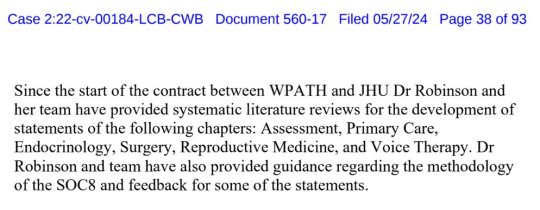


==
So, there are 6 completed reviews sitting somewhere, that WPATH knows shows undesirable (to them) results. And they know it. And despite - or perhaps, because of - that, they wrote the insane SOC8 anyway. And then, at the behest of Rachel Levine, went back and took out the age limits, making it even more insane.
This isn't how science works, it's how a cult works.
When John Templeton Foundation commissioned a study on the efficacy of intercessory prayer, a study which unsurprisingly found that it's completely ineffective, it was forced to publish the negative results.
So, even the religious are more ethical than gender ideologues when it comes to science. This is outright scientific corruption.
#Jesse Singal#Johns Hopkins#Johns Hopkins University#WPATH#World Professional Association for Transgender Health#anti science#gender cult#corruption#medical malpractice#medical corruption#medical scandal#systematic review#Cass review#Cass report#gender affirming care#gender affirming healthcare#gender affirmation#ideological corruption#religion is a mental illness
262 notes
·
View notes
Text

Student June Bronfenbrenner at an early Xerox machine photocopying a book, Milton S. Eisenhower Library, Johns Hopkins University, Baltimore, Maryland, 1976.
#technology#photocopier#Xerox#library#June Bronfenbrenner#Milton S. Eisenhower Library#Johns Hopkins University#Baltimore#Maryland#USA#1976
142 notes
·
View notes
Text
32 notes
·
View notes
Text

Researchers report pathway to stronger alloys for extreme environments
At around 2,500 degrees Fahrenheit, steel melts. When aluminum is exposed to moisture and oxygen, it corrodes. While these conventional alloys are well suited to everyday environments, they fold under abnormally excessive exposure to extreme heat, cold, pressure and other conditions. And with the nation conducting more and more operations in extreme environments, such as space and the Arctic, the need for alloys that maintain strength under these conditions is critical.
Multi-principal element alloys (MPEAs), which are made up of several elements in roughly equal proportions, can be better suited for extreme environments because their high strength, hardness and toughness over a range of temperatures. In addition, MPEAs often exhibit excellent corrosion resistance and thermal stability, and can display unique functional properties useful for electronic or magnetic devices.
Read more.
#Materials Science#Science#Alloys#High temperature materials#High entropy alloys#High entropy materials#Johns Hopkins University
11 notes
·
View notes
Text
You can take part in the survey whether or not you've had covid. They are looking for both. Recently, it was announced that they had a shortage of responses from people who who haven't had covid, but I don't know if that's still an issue. In any case, they are still looking for about 8,000 more participants.
#covid 19#making an original post because the op of the other one going around didn't want it reblogged with comments apparently#so I deleted my previous reblog with a comment#citizen science#science#johns hopkins university#long covid
15 notes
·
View notes
Text
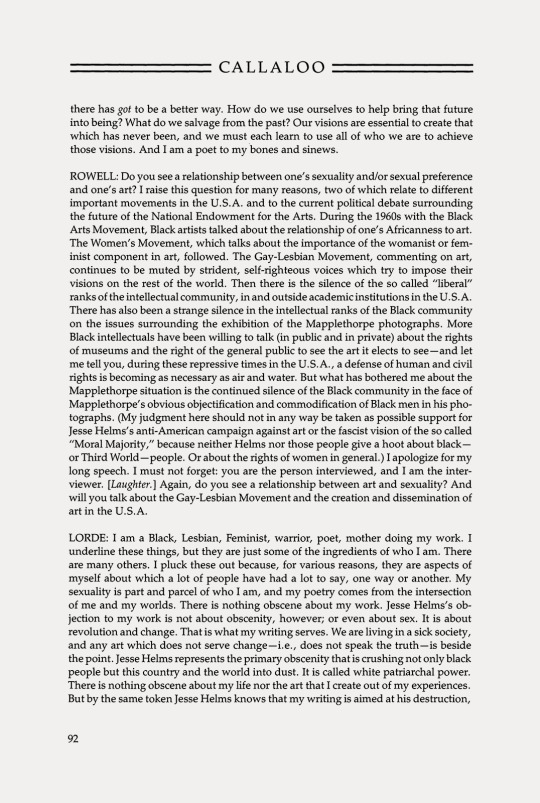
Charles H. Rowell, Above the Wind. An Interview with Audre Lorde, «Callaloo», Vol. 14, No. 1 (Winter, 1991), Johns Hopkins University Press, Baltimora, MD, [pp. 83-95], pp. 92-93
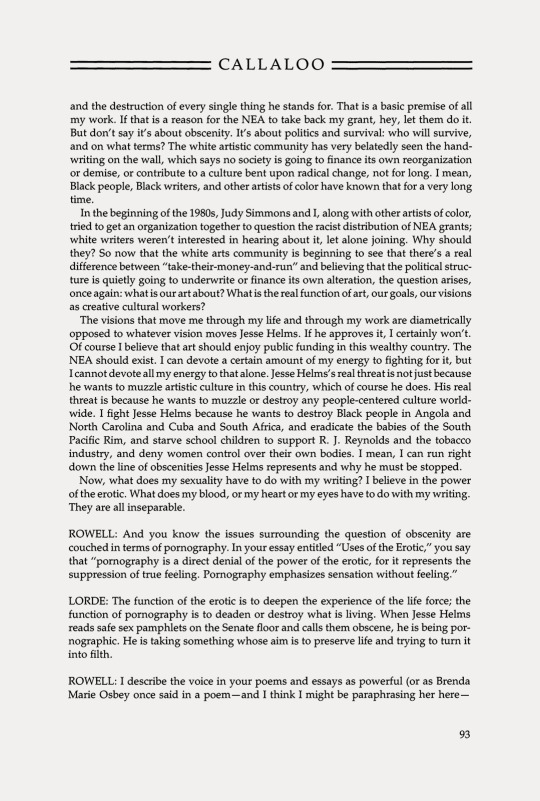
13 notes
·
View notes
Text
By Bayani
This year, the Baltimore Peoples Power Assembly held its annual International Workers’ Day celebration at the newly established Palestine solidarity encampment at Johns Hopkins University. About a hundred already supporting the encampment were joined by hundreds more.
#MayDay2024#PPA#Baltimore#gaza solidarity encampment#protest#johns hopkins university#Struggle La Lucha
10 notes
·
View notes
Text
Anyone know where I can get a second hand Johns Hopkins University teddy bear or plushy, like the kind that they sell around graduation and such? My friend had such a miserable time fighting the constant ableism of JHU's staff and inaccessible building infrastructure that I want to get her dog a JHU toy to maul for Christmas (without actually giving money to JH). I can't find anything on ebay but clothing.
#seriously i don't know a single alumnus disabled or abled that didn't have an awful time at JHU#johns hopkins#Johns hopkins University
12 notes
·
View notes
Text


Was given this at the JHU encampment today and told to share on my socials...don't think the person could have imagined Tumblr is my only social but here we are.
3 notes
·
View notes
Text
Daily News Recap from Natalie at Life After A Cult: Scientology Protests
This group has shown unequivocally how non-violent and non-performative protesting can be extremely effective. The Progressives are LYING through their teeth, in their defense of troublemakers on college campuses right now. The whole idea has been to radicalize kids here, just as was done in South America. Acting on Socialist Marxist principles (proverbially elite-funded, for decades) necessitates becoming a criminal. If none of the chaos agents are held accountable for their actions, the entire Leftist ecosystem will just keep getting more dangerous, virtually becoming the twin to Far Right and sticking Americans in the middle of their forever revolutions.
Get a clue. Don't fall for this bullshit. I want Israeli influence out of my country too. This isn't how you do it. They're just handing the Right more ammunition. The absolute fucking privilege.
#SCIENTOLOGY NEWS RECAP WITH LIFE AFTER A CULT NATALIE#FEATURING MORE TOM CRUISE DISHING#LARA FM LEARNING AND LOVING REMIX#SCIENTOLOGY PROTESTERS SHOWING HOW IT'S DONE#VS#PRIVILEGED FUCKERS AT ELITE UNIVERSITIES#COLUMBIA UNIVERSITY#NYU#UCLA#PRAGER U#JOHNS HOPKINS IS LOUSY#FREE PALESTINE#PROGRESSIVES#RADICALIZING YOUR KIDS WHILE GETTING FUCK ALL DONE#California#Texas#New York#Tom Cruise#Regressive Progressives#THROWING RED MEAT TO THE FAR RIGHT#ABC#NBC#CBS#CNN
3 notes
·
View notes